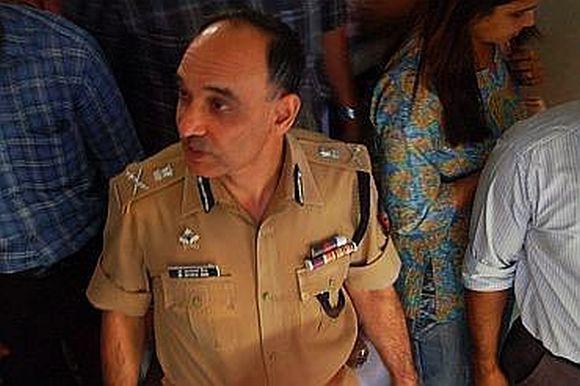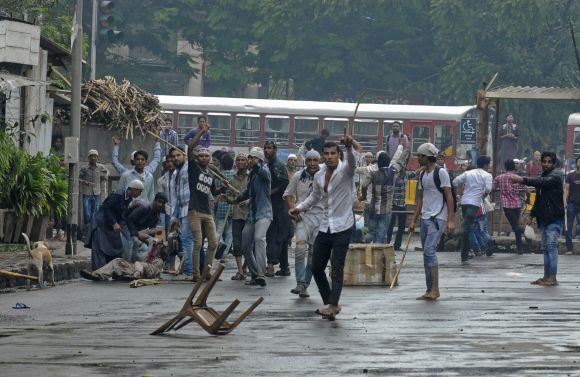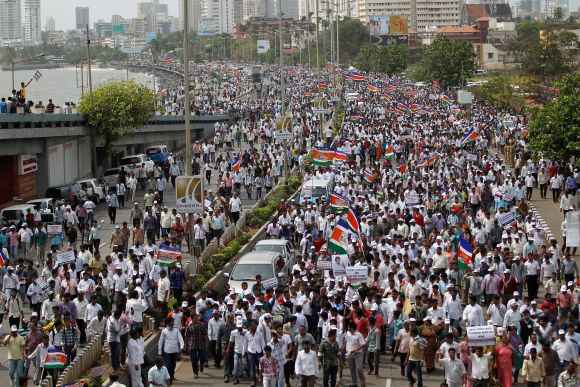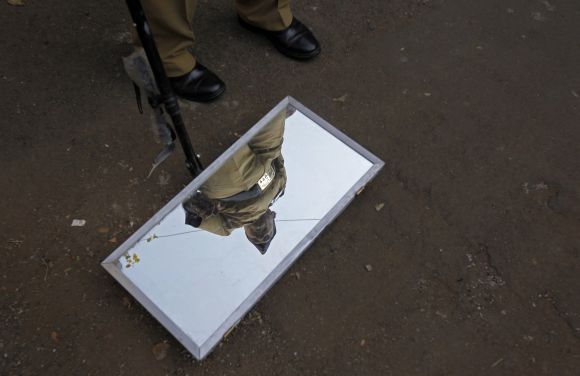
Mumbai Police Commissioner Dr Satyapal Singh, the 37th police chief of the megapolis who took charge last month, is one of the most competent law enforcers to take over the reins of the city police. Regarded as a no-nonsense officer, Dr Singh's non-controversial career is peppered with several highs.
In the late '90s, when the mafia in Mumbai went berserk with several high profile killings, Dr Singh, who was then the additional commissioner of police, Mumbai north west region, formed special police squads to call the bluff of Chhota Shakeel, Arun Gawli and Chhota Rajan gangs. To this day, the notorious gangs have not recovered from that body blow.
Dr Singh is also the author of two bestselling books: one on tackling the Naxal menace, and the other a self help book, Talash Insaan Ki (The Search for Man), that has sold over a lakh copies and has been translated into several languages.
Dr Satyapal Singh's stint as Pune police chief did run into rough weather at one point, but he persevered with his Mrityunjay Mission programme which he initiated in 2008. The Mrityunjay Mission roped in college students who were introduced to the basics of security, the dangers of terrorism and police patrolling. It was a huge success as Pune, an educational hub, gained a lot from this student-police interaction.
An IPS officer of the 1980 batch, Dr Singh firmly believes in justice and "the humane face of policing". He is probably the first police commissioner who does not wear his arrogance on his sleeve, instead his humility is legendary.
In his first exclusive interview since he took charge as the Mumbai police commissioner, Dr Satyapal Singh fields a volley of uncomfortable questions from S Hussain Zaidi.
Please click NEXT to read the interview...
S Hussain Zaidi is a veteran journalist and author of several bestselling books including Black Friday, Mafia Queens of Mumbai and Dongri to Dubai, six decades of Mumbai Mafia.

There are two theories floating about why you were shunted out of Pune as the police commissioner. The German bakery blast, and your running feud with the alleged high-handedness of Congress leader Ramesh Bagwe.
I was not shunted out. I was transferred from Pune after I completed my tenure of two years in the city. In fact I held the charge for an additional month, beyond the stipulated tenure. My transfer came during the general transfer season. So you cannot term it as shunted out. Also my transfer was not politically motivated either.
How did you lower your guard on German Bakery, despite it being such a sensitive spot?
We had sent three letters to the owners and management of the German bakery (at Koregaon Park area in Pune) to apprise them about the possible terror threat in unclaimed packages, and suggesting other security measures. The bakery used to attract a lot of foreigners. But they did not show any signs of paying attention.
Actually, on the day of the incident (February 13, 2010), the unclaimed bag was lying in that spot for 90 minutes. Even when a waiter informed the manager, no action was taken for 25 minutes, until it resulted in the blast.
There is a complete police report on the incident and there is no bungling of any sort whatsoever. Even the then Union Home Minister P Chidambaram had defended the Pune police in Parliament. How can you blame the police when the owners themselves are not interested in their own security as well as of their customers?
In fact, most of the business establishments, theatres and all places of heavy footfalls were sensitised towards the terror threat. We had conducted the Mrityunjay programme to sensitise the common citizens to the terror menace. Over two lakh students from about 300 educational institutions in Pune were effectively sensitised to the dangers of terrorism and communalism.
Any plans to replicate Mrityunjay mission here in Mumbai?
Right now our priority is a peaceful Ganeshotsav. It is for the first time that as a police commissioner I am meeting all the mandal chiefs in the city and asking them to be on alert. It has never been done before. Once we are through with this festival, then we will launch the Mrityunjay programme here as well.
Please ...

If you were the police commissioner, how would you have handled the situation at Azad Maidan on August 11?
It is difficult to say that in retrospect, unless one is present at the spot. It is also not fair to comment on it since I was not in-charge then.
The general perception is that the rioting should not have continued for 40 minutes. (Then Mumbai police chief) Arup Patnaik did not want to open fire as it would have resulted in large-scale casualties. What would you have done under the circumstances?
The police officers are trained to disperse an unruly mob. I would have used all the time-tested techniques. Police is here to enforce the rule of law and provide protection to the lives and property of citizens. Once the mob is scattered, half your battle is won.
Last year, Patnaik and you both were in the fray for the top job (Mumbai police commissioner's post). Why were you ignored then? Did the chief minister back him and overlooked you?
No way, Arup is senior to me, so he got precedence. The government generally goes by seniority. Like when he was promoted, I was the senior-most officer, so I was appointed the CP. No one was played favourite and none was superseded.
I believe his sudden transfer has caused a lot of bad blood between you both. In fact a city tabloid even carried a series of pictures on how both of you did not see eye to eye during the whole takeover ceremony.
That's out of the question; there is no bad blood between us. The whole drama is media-created. During the takeover, the photographers kept asking us to look at them, which we both did, and later on it was twisted as both of us avoiding each other. We are good friends -- even before I succeeded him we were meeting every two weeks.
Please ...

It is widely believed that (Maharashtra Navnirman Sena chief) Raj Thackeray's rally claimed Patnaik's job. Was he a victim of a political conspiracy?
I don't think Raj Thackeray's campaign claimed Arup's job. Two days before Thackeray's morcha, a senior member of his party had called and congratulated me on my new assignment. The decision was taken a few days before -- even Arup had an idea about it.
Why did Raj Thackeray come to meet you soon after you took over?
Raj told me he meets every police commissioner and municipal commissioner. He had come with the delegation of his party members.
What did Raj Thackeray tell you?
Nothing significant. He said, "I came to convey best wishes and to tell you to take care of the police force."
What are you doing to improve the morale of the police force?
When I took over, the force was some what demoralised. Never in the history of the Mumbai police were policemen beaten and policewomen molested.
We have had two general darbars and open meetings with the constabulary and officers. One at Shanmukhananda Hall and the other at the Naigaon police headquarters. We called 10 constables from each police station and hundreds from traffic and other branches. We heard their grievances and promised to redress them.
Many of them were resolved on the spot. It was an open dialogue and an interactive session. I was told that such a meeting had happened after a long time.
What did you tell your men?
I told them as a head of the police family, I am not only their head, but also behind them. If they commit a genuine mistake, they could count on me. If there are no malafide intentions, am always willing to help them.
Won't your officers take undue advantage of your compassionate stance?
I have already started holding public darbars in every zone. I will be meeting any citizen who would be coming to see me in office. If citizens have any complaints or issues they can come and meet in the police station and in my office and point out at any officer who is not looking into their problems. This also puts my officers under watch from public as well as seniors.
Secondly, I have asked them to register all the cases. Even chain-snatching cases, which were earlier registered as theft, are now registered as robbery.
Please ...

Do you think Raj Thackeray's Bihari-Maharashtrian stand-off will gather steam and snowball into a major conflict?
I am a professional law enforcer. I would not like to comment on political controversies. We are here to implement the rule of law. You will not find me wanting in that aspect.
What are you doing to contain terror in the city?
Terrorism has two aspects -- subversion and sabotage. Often subversion precedes sabotage. We have to plan our measures on both these fronts. We have to create awareness among the youth and students in all schools and colleges.
A bomb does not discriminate between Hindus and Muslims. We have got to make society alert and take care of radical preachers. We have involved leaders from the minority community and they are cooperating with the police.
We have also involved the local and zonal police in macro- and micro-planning. We have geared up our intelligence machinery to the level of the beat constabulary. Our frequent large-scale mock drills will also instil confidence in the the police team as well as reassure the public.
How do you do this?
We have been quietly working behind the scenes. Our men leave behind a bag in a cinema hall to check how the security establishment of a cinema house is working. We also do several such things to keep everyone alert.
We have also to sensitise the taxi unions, auto unions, trade unions and other major groups to chip in with the police. We don't want friends of the police, we want friends of society.
What is the status with assistant commissioner Vasant Dhoble, who put a spoke in Mumbai's night life with his raids? Have you sent him back to the crime branch?
Dhoble is a good officer. Traditionally, the social service branch was part of the crime branch, it was never an independent wing. I have only restored the connection. Dhoble is not transferred out of the city. He still remains in the city police and continuing the good work.
So there will be no more moral policing?
I know only one type of policing as per the law, I don't classify it as moral or immoral policing.
You are due for promotion in six months, do you think your tenure is too brief to bring about any positive change in the system?
That's the government's prerogative. I will do good work in whatever tenure I get to serve. I want to help the society and I'm committed to public service.
It is said that (Union agriculture minister and Nationalist Congress Party supremo) Sharad Pawar was instrumental in your appointment.
I'm the senior-most officer in the state cadre. I came here because of my seniority and merit. I am grateful to the government for their fairness.
...